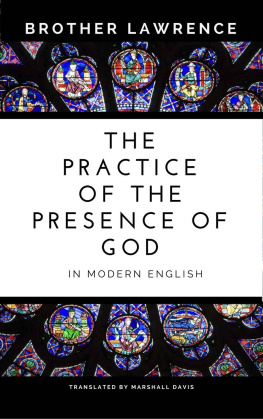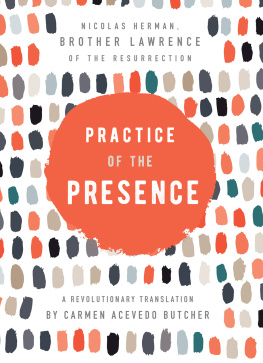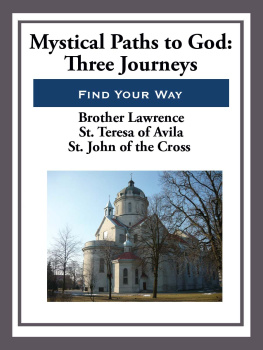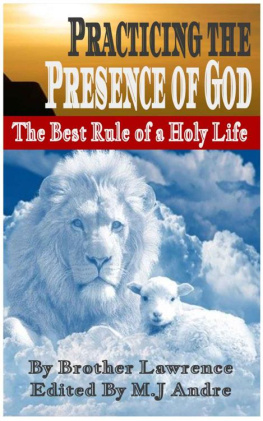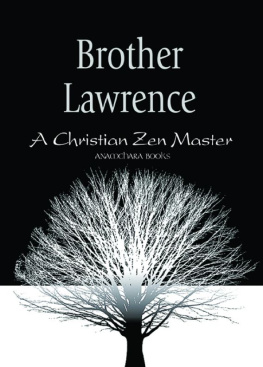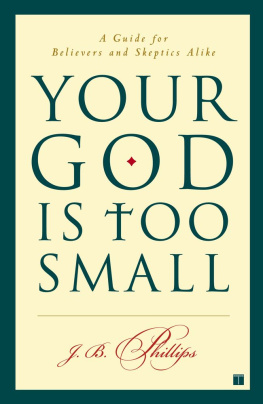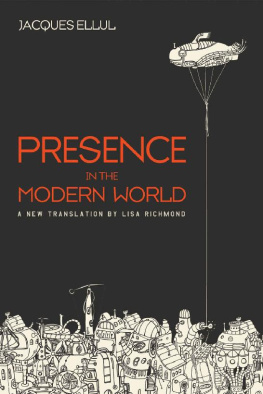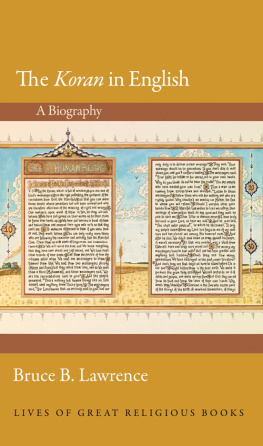The Practice
of the Presence
of God
In Modern English
Brother Lawrence
Translated into Modern English by Marshall Davis
Text copyright 2013 Marshall Davis
All Rights Reserved. No part of this publication may be reproduced, stored in a retrieval system, or transmitted in any form or by any means electronic, mechanical, photocopying, recording or otherwise without the prior permission of the publisher.
Cover design: Chartres Cathedral's North Rose Window by Ryan Rusnak
ISBN-10:0989835065 (ebook)
ISBN-13:978-0-9898350-6-0 (ebook)
CONTENTS
PREFACE
Brother Lawrence was born Nicolas Herman in 1611 in the town of Hrimnil in the French Lorraine. Born into a poor family, he received little formal education as a child. As a young man, he joined the army and fought in the Thirty Years' War. At the age of eighteen, while in military service, Herman had an experience of God that began his spiritual journey.
During winter, Herman saw a barren tree, stripped of leaves and fruit. While contemplating the upcoming springtime and the transformation that would happen to the tree, a transformation of his soul occurred. His friend and biographer described it in these words: At that moment he saw clearly the Providence and Power of God. Brother Lawrence had awakened to the Presence of God. That awareness of Divine Presence continued unabated for the rest of his life.
A short time after this experience (which is usually referred to as his conversion), a serious injury to his sciatic nerve forced him to retire from the army. This injury left him lame and in considerable pain for the rest of his life. After leaving the army, he lived for a period of time in solitude. It seems that during this period of time he integrated his new spiritual awareness into his life. Eventually, out of financial necessity, he took a job as footman. But within six years he had entered the Discalced Carmelite monastery in Paris. He took the name Lawrence of the Resurrection.
Nicolas entered the priory as a lay brother, not having the education necessary to become a priest. He spent the rest of his life within the walls of this large monastic community, working in the kitchen for most of his life and later as a cobbler. While assigned to the kitchen, working at the tedious tasks of cooking and cleaning, he developed the practice of living always in conscious awareness of God.
Despite his humble position in the community, his reputation attracted many visitors from the outside who sought spiritual guidance from him. The practical wisdom that he shared would later become the basis for this book, The Practice of the Presence of God. His death in 1691 occurred in relative obscurity, but his teachings continued to live on in his words.
Monsignor Joseph de Beaufort, vicar general to the archbishop of Paris, had become Lawrences friend. He compiled notes of his conversations with Lawrence, letters written by him, and his Spiritual Maxims, which were found in his room after his death. He published these together in a single volume in 1693, two years after Brother Lawrences death.
The little book quickly became a devotional classic among both Catholics and Protestants. In later editions the Maxims came to be omitted from English versions. No English translation of The Practice of the Presence included the Maxims after one printed in Edinburgh in 1741. Here in this Modern English edition the Maxims are reunited with the Conversations and Letters into a single volume.
The first English translation of the complete work appeared in 1724 and became widely read by English speaking readers. Among its greatest admirers was John Wesley, the founder of Methodism. Today The Practice of the Presence of God is recognized as a work of great spiritual depth by a broad range of traditions, from evangelical Christians to adherents of non-Christian spiritual traditions.
Today the book is found most often in the form of an anonymous English translation from the early 19th century. That is the edition found in Christian Classics Ethereal Library, Project Gutenberg, and the vast majority of printed editions. This present translation is based on that early English version and another nineteenth century translation of the Maxims. This Modern English edition is complete and unabridged. It seeks to preserve the historical integrity of the original, while making it accessible to the modern reader.
The translation process has been a labor of love for this editor. I have personally found Brother Lawrences words to be an inspiration throughout my life. I have read this short work countless times over several decades. Yet when I have recommended it to others, the response I often received was that it was difficult to understand. The archaic wording and obsolete vocabulary made it inaccessible to many who would otherwise benefit from it. With such readers in mind, I have slowly and prayerfully rendered it into language easier to understand. I pray that God may use this translation as an instrument of blessing to others.
Marshall Davis
October, 2013
CONVERSATIONS
FIRST CONVERSATION
I first met Brother Lawrence on August 3, 1666. He told me that God had done a supreme work of grace in his life through his conversion at the age of eighteen. It happened in winter. He had noticed a tree stripped of its leaves. He realized that in a little while the leaves would return, and the flowers and fruit would appear. At that moment he clearly saw the Providence and Power of God. That awareness of God had never dimmed. This experience had perfectly set him free from this world. It ignited in him a love for God that was so great that he could not tell whether it had increased during the forty years since that day.
Prior to being a monk, Lawrence had been a footman in service to Monsieur Fieubert, who was a treasurer. Lawrence described himself as a big awkward fellow who broke everything. When he originally entered the monastery, he thought that he would be made to suffer for his awkwardness and faults. In this way he hoped to offer his life and all its pleasures as a sacrifice to God. But God had disappointed him. He had found nothing but contentment in the monastery.
He said that we should establish ourselves in a sense of Gods Presence by continually communing with Him. It is shameful to abandon this divine communion to occupy our minds with trivial matters. We should feed and nourish our souls with high thoughts of God, which yield us great joy in devotion to Him.
We ought to awaken faith. It is regrettable that we have so little faith. Instead of living in faith daily, people amuse themselves with religious devotions, which are continually changing. The way of faith is the spirit of the Church, and it alone is sufficient to bring us to a high degree of perfection.
We ought to give ourselves to God in both mundane and spiritual matters. We should seek our satisfaction only in fulfilling His will, whether that leads to suffering or comfort. All things are equal to a soul truly surrendered to God. There needs to be faithfulness in the dry seasons of the spiritual life, when we feel distant from God and find prayer burdensome. At such times, God is testing our love for Him. Those are the times when we should surrender ourselves to God. If we do this, it will result in spiritual advancement.
He was not surprised to hear about all the sufferings and sins in the world. On the contrary, he was surprised there were not more, considering the malice sinners were capable of. He prayed for them, but he knew that God could change things whenever he wanted. Therefore after praying, he gave it no further thought.
To arrive at such surrender to God, we should pay attention to the human passions that mingle with the spiritual desires within us. God gives insight concerning those passions to those who truly desire to serve Him. He said that if it were my intent to sincerely serve God, I could visit him as often as I wanted, without fear of being a bother to him. But if this was not my intention, I should not come to see him again.
Next page
